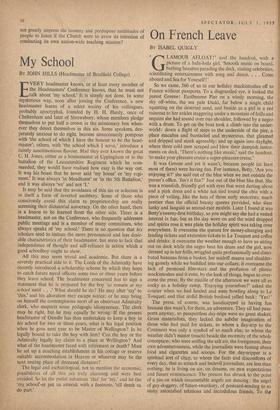My School
BY JOHN HILLS (Headmaster of Bradfield College) EVERY headmaster knows, or at least every member of the Headmasters' Conference knows, that he must not talk about 'my school.' It is simply not done. In some mysterious way, soon after joining the Conference, a new headmaster learns of a select society of his colleagues, probably apocryphal, founded by H. H. Hardy, once of Cheltenham and later of Shrewsbury, whose members pledge themselves to put half a crown in the missionary box when- ever they detect themselves in this sin. Some speakers, des- perately anxious to do right, become unnecessarily pompous with 'the school of which I have the honour to be the head- master'; others, with 'the school which I serve,' introduce a faintly sanctimonious flavour. Had they ever known the great C. H. Jones, either as a housemaster at Uppingham or in' the battalion of the Leicestershire Regiment which he com- manded, they would have realised how easy is the way out. It was his boast that he never said 'my house' or 'my regi- ment.' It was always 'in Meadhurst' or 'in the 5th Battalion,' and it was always 'we' and not 'I.'
It may be said that the avoidance of this sin or solecism is in itself a form of inverted snobbery. Some of those who consciously avoid this claim to proprietorship are really screening their dictatorial autocracy. On the other hand, there is a lesson to be learned from the other side. There is a headmaster, not on the Conference, who frequently addresses public meetings and is a member of many committees, who always speaks of 'my school.' There is no question that his scholars tend to imitate the more pronounced and less desir- able characteristics of their headmaster, but seem to lack that independence of thought and self-reliance in action which a good schoolboy ought to show.
All this may seem trivial and academic. But there is a severely practical side to it. The Lords of the Admiralty have recently introduced a scholarship scheme by which they hope to catch future naval officers some two or three years before they leave school. The headmaster concerned has to sign a statement that he is prepared for the boy 'to remain at my school until . . .' What should he do? He may alter 'my' to 'this,' and his alteration may escape notice; or he may bring on himself the contemptuous snort of an observant Admiralty clerk, who suspects some pedagogic idiosyncrasy. The clerk may be right. but he may equally be wrong. If the present headmaster of Oundle has thus undertaken to keep a boy in his school for two or three years, what is his legal position when he goes next year to be Master of Wellington? Is he legally bound to take the boy with him? Can the boy or the Admiralty legally lay claim to a place at Wellington? And what of the headmaster faced with retirement or death? Must he set up a coaching establishment in his cottage or reserve suitable accommodation in Heaven or whatever may be the next resting place of deceased dictators?
The legal and eschatological, not to mention the economic, possibilities of all this are truly alarming and were best avoided. So let the purist substitute 'this' for 'my,' and let the 'my schoor-er put an asterisk with a footnote, 'till death us do part.'














































 Previous page
Previous page